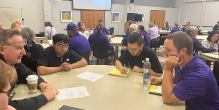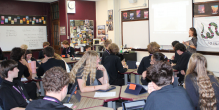Connecting Curriculum to the Environment
By Jenny Markert, English teacher
December 17, 2019
For five days last summer, I had the opportunity to participate in the 2019 Summer Environmental Writer’s Workshop at the Omega Institute in the beautiful Hudson River Valley, near Rhinebeck, New York. While there, I had an idea, a way to combine my love for the earth with my passion for writing and teaching writing.
My week at Omega included meditation, yoga, observing, writing, collaborating, engaging in inquiry, and reading aloud. Meals were entirely sourced from local farms and sustainable conditions, and learning about that process was part of the week’s activities as well. According to their Website, Omega Institute is, “A nonprofit, mission-driven, and donor-supported educational organization.” For more than 40 years Omega has pursued holistic studies: integrating personal growth, environmental consciousness, and social change to help the earth and every being who lives here. Being there, I felt renewed hope for humanity.
But don’t get me wrong. I have anger, frustration, and fear about climate change. Who knows what’s real—and what isn’t—about how serious it is? Every magazine and newspaper headline about the future indicates it looks grim. To deal with these worries, we all need to act.
Writer Amy Irving, a teacher at the workshop, told our class that everything we do from here forward has to include something about the environment—the issues are that big and that pressing. It is not enough just to love nature and enjoy it for what it gives us, we have to make some kind of positive impact for the future. That means all of us.
Her insistence inspired me to create a class focused on the environment.
Science teacher Julie Quinn-Kiernan teaches APES, Advanced Placement Environmental Science. She already teaches a pretty great class on the environment, but she agrees, “There is so much more to learn beyond a strictly-science class. Creating a class in another department would be an ideal complement to APES.” Politics, economics, activism, and education are just a few other realms also impacted by and influencing climate change. Literature, art, music, faith, and history are also crucial realms interconnected with nature.
Many colleges and universities across the country and the globe are incorporating environmental classes, and many now offer environmental studies as a major or minor with a B.A. or B.S. degree. Graduate programs are being offered too. The popularity of these studies is steadily growing.
Still, the focus is on the scientific aspects of the environment and climate change. I hope to see this area of study expand in scope, not just grow in numbers. I would like to see schools everywhere, and at all levels, from pre-school to post-graduate, incorporating areas of study that include, for example, nature readings and writing, local and global activism, and building awareness about and dedication to the natural world on every front.
I may not have the power to add nature writing to schools everywhere, but I am excited to add it as an option at CDH! Look for this new topics course under the English offerings when planning for the 2020-21 school year. It will be up to the students to determine just how much it can and will make a difference.
Subscribe to our e-Newsletters
You might also like:
Beyond the Books - October 2025
The latest news from Athletics, Band, Choir, JROTC and Theater.
CDH Hosts Future Catholic Educators Through the LIFT Program
This fall, CDH proudly welcomes four college students from the Lasallian Institute for the Formation of Teachers (LIFT), a mission-driven program shaping the next generation of Catholic educators through hands-on experience, community life, and faith-based formation.
A New Way to Teach Indigenous Perspectives at CDH
At Cretin-Derham Hall, a redesigned U.S. History curriculum encourages critical thinking, and invites students to see the American story through a broader, more inclusive lens.




